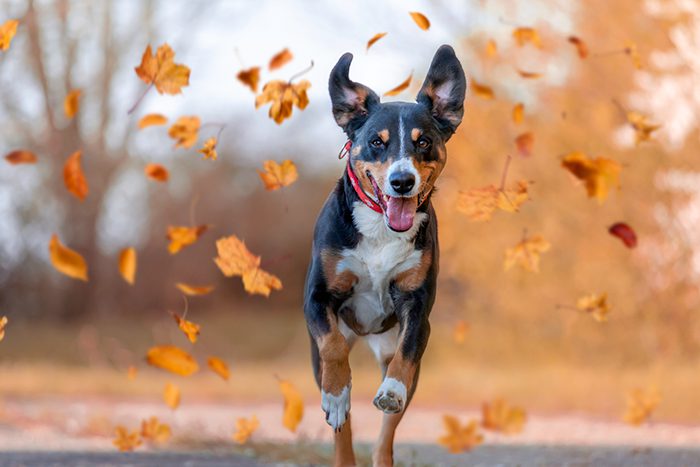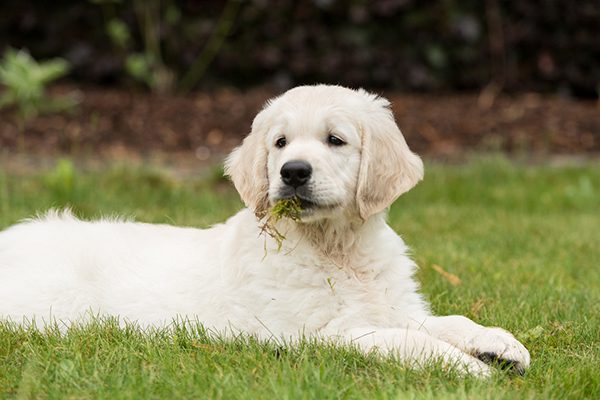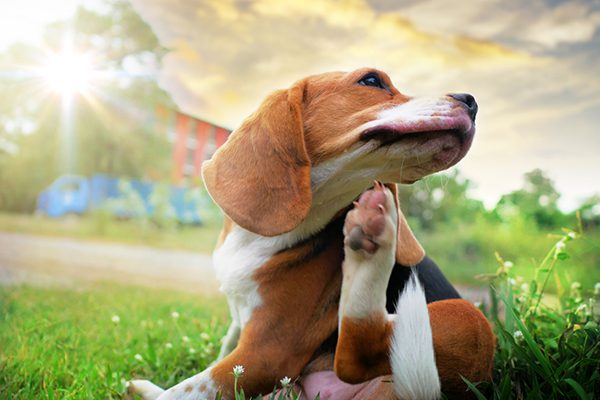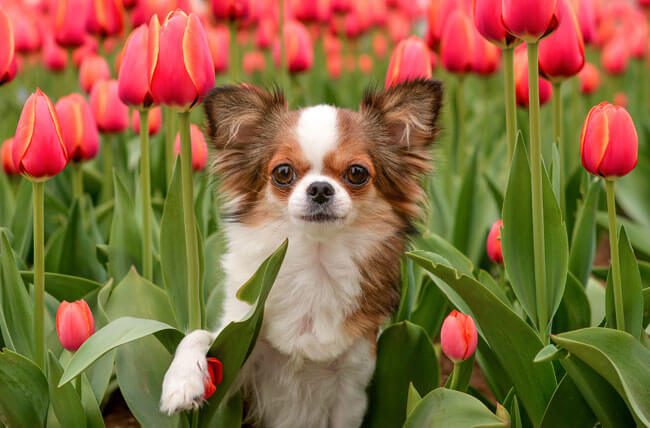Clifton Park Pet Owners: 7 Important Pet Safety Tips for Fall
At the start of fall, pet parents should know that their pets are subject to unique dangers that they want to watch out for. Dogs and cats often go unsupervised as pet parents get busy for the holidays.
From Halloween candy to Thanksgiving dinner and finally, putting up the Christmas tree, you need to be aware of some hazards so you can keep your pets safe. Before the holidays, make a list of all the dangers for your pet so you can refer to it when things become too hectic to remember.

Pet safety is a valid concern. Fall can present a plethora of situations you need to be prepared for. Read this article to find out seven important pet safety tips for fall.
7 Fall Pet Safety Tips
There are fun things to do in the fall, as people are getting ready for the holiday season. Unfortunately, some of the best activities for humans can have the worst outcomes for pets. The following are seven fall pet safety tips to keep in mind this autumn:
1. Candy Is Everywhere
We all love the Halloween festivities. It can be fun to play dress-up, and you can even put your pets in adorable little costumes so they can play along. However, Halloween candy is a no-no for your pets. Most Halloween candy contains chocolate (see video) which is toxic for pets. Some of the warning signs your pet has consumed chocolate include:
- Seizures
- Vomiting
- Diarrhea
- Restlessness
- Elevated heart rate
If you believe your pet has eaten chocolate, you should call your vet immediately. You may also want to find out what type of chocolate has been consumed.
Baking chocolate, semi-sweet and dark chocolate are the worst for dogs and cats. These types of chocolate contain high amounts of theobromine, as well as caffeine, neither of which are good for pets. Chocolate can kill your pet, and it must be stressed that you be extremely careful.
Watch out for cookies and candy containing xylitol, which is a sugar substitute. It is deadly to pets and can result in liver failure. Raisins are also poisonous for your pets.
It is imperative to keep your babies away from candy. Make sure that your children and family know that candy is toxic to your pets. Make a list of toxic foods and put it on the fridge as a reminder.
You can also store candy in a locked jar or container and keep it in a particular place so that your dog or cat cannot get to it.
2. Bad Superstitions
Around Halloween, many black cats are not adopted out because shelters do not want to take the chance or irresponsible owners let their cats get out at night. Much research has been completed that reveals that black cats are a target because of people’s awful superstitions.
This reason is why no-kill black cat shelters exist.
It is imperative not to let your black cat out around or during Halloween. Another problem during the “fallback” time is traffic at night and black cats being out. It is hard to see a black cat at night, and accidents are more likely to occur. Please keep your black beauties safe and indoors!
3. Human Halloween Costumes
It is fun to dress up for Halloween, but many costumes for humans have strings or loose pieces of fabric that can become a choking hazard for your dog or cat. Anything from a costume they chew up and swallow that they are not supposed to can lead to an obstruction that may require surgery.
The most common sign that your pet has swallowed a foreign object is vomiting. If you believe your companion has ingested something they shouldn’t have, you must immediately take them to the vet.
Two Key Points to Remember:
- Never induce vomiting yourself without talking to a veterinarian.
- Never pull out a foreign item coming out of your pet’s rectum because it can cause severe damage.
Face paint and Halloween makeup can also be toxic to pets. Do not let your pet eat makeup, and certainly do not put any makeup on them.
4. Candles
When fall comes around, the fall and holiday scented candles start coming out. Whether it is pumpkin pie or apple crisp, your cat is likely sensitive to the aroma of the candle. Pets cannot typically tolerate the toxins and chemicals that are released by burning the candle.
Scented candles and Paraffin wax candles are not good for your pet. The flame of the candle is also dangerous for them. It can be irresistible to your cat. The scents used in candles can make it difficult for them to breathe.
5. Holiday Plants
Many plants are poisonous for pets. Holly and mistletoe can make your pets sick. Symptoms of your pet ingesting holly or mistletoe include:
- Vomiting
- Diarrhea
- Excessive drooling
- Abdominal pain
Mistletoe contains substances that are harmful to dogs and cats. If a large enough amount of these plants are eaten, it could result in the death of your pet.
Lilies and daffodils are also poisonous to your pets. Lilies are the most dangerous. Even if your cat eats only a small amount of the plant, it can lead to an extremely high heart rate and convulsions. It is safest to keep these plants out of your house altogether.
The Christmas tree is not good for pets either. The water used to sustain the tree can be detrimental to your pets. Keep the water blocked off so that pets do not drink out of the water for the tree.
6. Thanksgiving Foods
It may be irresistible to allow your dog under the table to catch some food scraps during Thanksgiving dinner. After all, pets are family, and you want them to join in the festivities. Before you let your pup chew on the turkey leg, you should know that it is like swallowing a knife if they swallow the bone.
If your dog swallows a turkey bone, it can cause gastrointestinal damage. Other foods that are toxic for your pets include:
- Garlic
- Onions
- Raisins
- Nutmeg
Contact your vet if you see that your pet is vomiting or having diarrhea. It could be a sign that your dog or cat has eaten something they should not have. Alcohol is another no-no for your pet. Keep alcoholic drinks out of reach for them.
7. Cold Weather
When the weather gets cold, smaller breeds of dogs and those with short hair coats may need a sweater to keep from catching a cold, and it will also help them stay warm. Pet parents should also be aware that older dogs that are immune-compromised or those with endocrine issues need extra care and attention.
Colder weather can also aggravate arthritis in pets. If your pet is demonstrating symptoms of pain or discomfort, you should talk to your veterinarian to find out what you can do to help them be more comfortable.
Keep Your Pets Safe This Fall in Clifton Park, NY
When it comes to keeping your pets safe and healthy, pet parents should be vigilant about keeping certain items out of their reach, or you may need to forego having certain things in your house altogether. From Halloween to Christmas, the holidays often come with hidden dangers to your pets.
It is essential to know what the dangers are and what to do if they occur. Pets are our fur family, and even though we are all busy during the holidays, we need to remember to look out for their best interests.
Recent Posts
Why Do Dogs Eat Grass in Clifton Park, NY?
Why Do Dogs Eat Grass in Clifton Park, NY? Do you and your dog spend a lot…
Tips to Treating Your Dog’s Seasonal Allergies in Clifton Park, NY
Tips to Treating Your Dog’s Seasonal Allergies in Clifton Park, NY Spring and summer may be seasons…
Toxic Plants for Pets in Clifton Park, NY
Toxic Plants for Pets in Clifton Park, NY Curiosity is just part of our pet’s nature. Since…
About Us
Originally opened as Animal Care Hospital by Dr. Mark Johnston in 1989, the hospital became Cornerstone Veterinary Hospital in 2015 when it was purchased by Drs. Alan and Lisa Knott. The name 'Cornerstone' holds a special place in their hearts, representing not only their Christian faith but also their commitment to being the cornerstone of the community in which they practice. As a family-owned and operated practice, every pet is treated as part of the family, ensuring they receive the highest standard of care. The team at Cornerstone Veterinary Hospital is dedicated to building lasting relationships with clients and their beloved pets, striving to be the cornerstone of the community in which they practice.



